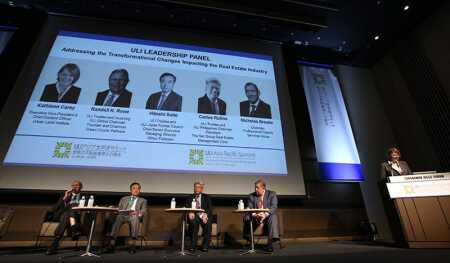Leadership, climate change, and technology were the focus of a panel discussion at the 2015 ULI Asia Pacific Summit in Tokyo on June 2. These three issues are among the nine core themes agreed on during the meeting of ULI’s global trustees and leaders in Paris in February.
Topping the list in importance during the discussion in Tokyo was leadership.
“I think we have to look for people who are lifelong learners, who look for the benefits of change and have the ability to push forward with change and be decisive,” said Randall Rowe, incoming ULI global chairman and a ULI trustee.
Asked what makes a successful leader, Hiroshi Saito, a ULI trustee and former chair of ULI Japan, cited late U.S. president Richard Nixon, who in his 1982 book Leaders wrote, “There is no single answer. Each leader belongs to a particular combination of time, place, and circumstances; leaders are not interchangeable.”
Nixon may have been talking about the leaders of nations, but his words apply equally to leaders of corporations, Saito said. “Leaders of Japanese corporations also need to have a global perspective, and that is becoming ever more important,” he said. “It is important for future leaders to see change in advance and to move quickly.”
One way to achieve that would be through sending young executives overseas to help them develop a world view of business. Saito also called for increased diversity in corporations in Japan, including through the promotion of young women into leadership roles.
The biggest challenge to Japan’s political leadership is the dramatic decline in the country’s population, Saito said. It will have a huge impact on the nation’s economy and needs to be remedied, he added.
In the Philippines, a major test of the nation’s leadership is the need to address the form of cities vulnerable to natural disasters, said Carlos Rufino, a ULI trustee and chairman of ULI Philippines. A recent report ranked Manila 47th among 51 cities for disaster preparedness, he noted.
“Climate change poses two main risks to the Philippines—rising sea levels and a lot of very powerful typhoons,” he said. As a consequence, tenants are demanding office properties that are designed to withstand extreme conditions, are equipped with backup generators, and have emergency supplies of food and water.

From left: Nicholas Brooke, chairman, Professional Property Services Limited; Hitoshi Saito, former chairman of ULI Japan and senior executive managing director, Mitsui Fudosan Co. Ltd.; Carlos Rufino, current ULI Philippines chairman and president, the Net Group Real Estate Management Corp.; Randall K. Rowe, incoming ULI global chairman and founder and chairman, Green Courte Partners; and Kathleen Carey, ULI executive vice president and chief content officer.
In addition to security, quality of life in urban spaces is becoming a bigger concern for many corporations and staff, said Nicholas Brooke, chairman of Hong Kong–based Professional Property Services Group.
“This is becoming a big challenge for cities,” he said, emphasizing that while there is little option but to build vertically in cities such as Hong Kong, it is imperative that developments incorporate green space and guarantee that residents are able to retain wellness as they age.
Turning to the question of technology, Rowe said a leader must not be reluctant to grasp and make use of changes in technology.
“Technology is now affecting every aspect of the real estate market, but the one that will have the most transformational impact on our cities, I believe, will be autonomous vehicles,” he said. “We will need fewer vehicles; we will use them more efficiently. The more efficient use of road capacity will free up space in our cities and may even make mass transit systems as we know them today obsolete.”
It is telling, he said, that at the peak travel time in the United States, only 12 percent of the nation’s cars are on the roads.
Brooke agreed that it is crucial to incorporate new technology into the property sector, including the exploitation of search engines, mobile devices, and social media.
“We also need to move out of our comfort zone and respond quickly to changes,” he said. “And I tell my teams in Hong Kong that flexibility is the key—the ability to adapt as we go forward.”




